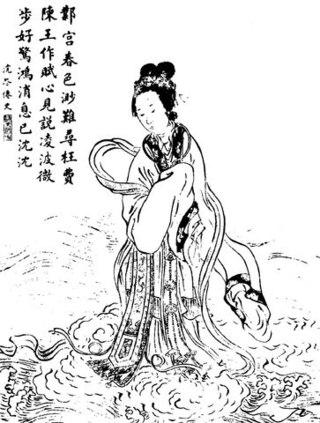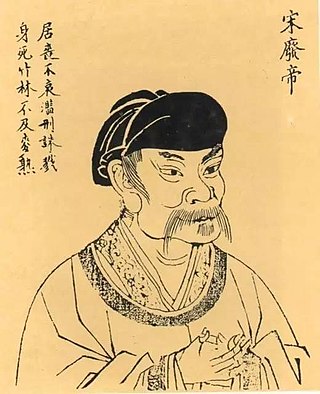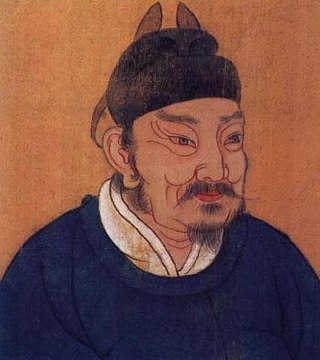Related Research Articles

Emperor Hui of Han, born Liu Ying (劉盈), was the second emperor of the Han dynasty. He was the second son of Emperor Gaozu, the first Han emperor, and the only son of Empress Lü from the powerful Lü clan. Emperor Hui is generally remembered as a somewhat weak character dominated and terrorized by his mother, Empress Lü, who became Empress Dowager after she encouraged her husband to command personally the war against Ying Bu, in which he died eventually from an arrow wound sustained during the war.
Emperor Chong of Han was an emperor of the Chinese Han Dynasty and the ninth emperor of the Eastern Han period.
Emperor Ling of Han, personal name Liu Hong, was the 12th and last powerful emperor of the Eastern Han dynasty. Born the son of a lesser marquis who descended directly from Emperor Zhang, Liu Hong was chosen to be emperor in February 168 around age 12 after the death of his predecessor, Emperor Huan, who had no son to succeed him. He reigned for about 21 years until his death in May 189.
Liu Bian, also known as Emperor Shao of Han and the Prince of Hongnong, was the 13th emperor of the Eastern Han dynasty in China. He became emperor around the age of 13 upon the death of his father, Emperor Ling, and ruled briefly from 15 May to 28 September 189 before he was deposed, after which he became known as the "Prince of Hongnong". His emperor title, "Emperor Shao", was also used by other emperors who were in power for very short periods of time. In March 190, he was poisoned by Dong Zhuo, the warlord who deposed him and replaced him with his younger half-brother, Liu Xie.

Emperor Xian of Han, personal name Liu Xie (劉協), courtesy name Bohe, was the 14th and last emperor of the Eastern Han dynasty in China. He reigned from 28 September 189 until 11 December 220.

He Jin, courtesy name Suigao, was a Chinese military general and politician. He was the military Grand Marshal and regent of the late Eastern Han dynasty of China. He was an elder half-brother of Empress He, and a maternal uncle of Emperor Shao. In 189, he and his sister shared power as regents when the young Emperor Shao was put on the throne following Emperor Ling's death. During the time, the conflict between He Jin and the influential eunuch faction intensified. After they overheard a conversation between He Jin and the empress dowager, the eunuch faction lured him into a trap in the imperial palace and assassinated him. While He Jin's subordinates, led by the warlord Yuan Shao, slaughtered the eunuch faction in revenge, the warlord Dong Zhuo took advantage of the power vacuum to enter the imperial capital Luoyang and seize control of the Han central government. Dong Zhuo's seizure of control and the subsequent breakdown of central command that followed brought forth the beginning of massive civil wars that lasted for nearly a century, during which time the Han dynasty came to an end and the Three Kingdoms period began in its place.
Empress He, personal name unknown, posthumously known as Empress Lingsi, was an empress of the Eastern Han dynasty. She was the second empress consort of Emperor Ling and the mother of Emperor Shao. After the death of Emperor Ling in 189, she became empress dowager when her young son, Liu Bian, became the new emperor. She was caught up in the conflict between her brother, General-in-Chief He Jin, and the eunuch faction, who were both vying for power in the Han imperial court. After He Jin's assassination and the elimination of the eunuch faction, the warlord Dong Zhuo took advantage of the power vacuum to lead his forces into the imperial capital and seize control of the Han central government. Dong Zhuo subsequently deposed Emperor Shao replaced him with Liu Xie and had Empress Dowager He poisoned to death.
Emperor Houshao of Han, personal name Liu Hong (劉弘), was the fourth emperor of the Han dynasty. He was a son of Emperor Hui and a unknown wife of him, likely by a concubine—although there is some controversy on the subject—and adopted by Emperor Hui's wife, Empress Zhang Yan. At the instigation of his grandmother, Empress Lü, Empress Zhang had Emperor Houshao's mother put to death.
The Ten Attendants, also known as the Ten Eunuchs, were a group of influential eunuch-officials in the imperial court of Emperor Ling in Eastern Han China. Although they are often referred to as a group of 10, there were actually 12 of them, and all held the position of zhong changshi in Emperor Ling's imperial court.
Consort Fu was an imperial consort during the Han dynasty of China. She was a consort and a favourite of Emperor Yuan. She was known to be a domineering woman who wanted her son on the throne, and, failing that, wanted her grandson on the throne as Emperor Ai. During Emperor Ai's reign, she exerted heavy and frequent influence on his reign, that made her powerful and dominant and forcibly extracted empress dowager titles that she should not have properly possessed – which would bring her hatred from the Wang clan and eventually the desecration of her tomb after her death.

Lady Zhen, personal name unknown, was the first wife of Cao Pi, the first ruler of the state of Cao Wei in the Three Kingdoms period. In 226, she was posthumously honoured as Empress Wenzhao when her son Cao Rui succeeded Cao Pi as the emperor of Wei.
Empress Wu, personal name Wu Xian, formally known as Empress Mu, was an empress of the state of Shu Han during the Three Kingdoms period. She was the last wife and the only empress of Liu Bei, the founding emperor of Shu Han, and a younger sister of Wu Yi.
Wang Xianyuan, formally Empress Wenmu, was an empress of the Chinese Liu Song dynasty. Her husband was Emperor Xiaowu.
Lu Huinan, formally Empress Dowager Zhao, semi-formally Empress Dowager Chongxian (崇憲太后), was an empress dowager of the Chinese Liu Song dynasty. She had been a concubine of Emperor Wen, and she became empress dowager because her son Liu Jun later became emperor.

Former Deposed Emperor of Liu Song or Emperor Qianfei, personal name Liu Ziye (劉子業), childhood name Fashi (法師), was an emperor of the Chinese Liu Song dynasty. His brief reign as a teenager was known for his violent and impulsive acts, including the slaughter of many high-level officials and his sexually immoral behavior. He was assassinated less than 18 months after becoming emperor.

Guo Wei, also known by his temple name as the Emperor Taizu of Zhou (周太祖), was the founding emperor of the Chinese Later Zhou dynasty during the Five Dynasties and Ten Kingdoms period, reigning from 951 until his death in 954.
Empress Hu was an empress consort and empress dowager of the Chinese Northern Qi dynasty. Her husband was Emperor Wucheng. She was the empress dowager during the reign of her son Gao Wei. Hu was known to be debauched and promiscuous, having multiple love affairs even with eunuchs. Even after the Northern Qi was overthrown by the Northern Zhou, she continued to have affairs with the new emperors until she died in the Sui dynasty.
Consort Tang was a consort of Liu Bian, the 13th and penultimate emperor of the Eastern Han dynasty of ancient China.
This article contains the family trees of members of the Cao clan, who ruled the state of Cao Wei (220–265) in the Three Kingdoms period (220–280) in China. Only Cao Cao's lineage is shown in this article. The lineages of his relatives, such as Cao Ren, Cao Zhen and others, are not included here.
Cao Hua (曹華) was a Chinese noble woman member of the aristocrat Cao family during the Three Kingdoms period at the end of the Han dynasty, She was the daughter of the warlord Cao Cao, the King of Cao Wei, and Lady Bian. She was a noble consort of Emperor Xian. Initially, her title was Furen ; in 214, her title upgraded to Guiren
References
- ↑ Although Lady Dong's age was not recorded, she should be born in the early 140s or before.
- ↑ According to Liu Hong's biography in Book of the Later Han, Lady Dong died on the xinhai day of the 6th month of the 6th year of the Zhongping era of his reign. This corresponds to 7 Jul 189 on the proleptic Gregorian calendar. [(中平六年)六月辛亥,孝仁皇后董氏崩] Houhanshu, vol. 08
- ↑ (萇,河閒孝王開孫淑之子也。) Annotation in Houhanshu vol. 10 (Part 2).
- ↑ (孝仁董皇后諱某,河閒人。為解犢亭侯萇夫人,生靈帝。) Houhanshu vol. 10 (Part 2).
- ↑ According to Liu Hong's biography in Book of the Later Han, Lady Dong was made guiren on the jiawu day in the leap month of the 1st year of the Jianning era of his reign. However, there is no jiawu day in said leap month, which corresponds to 25 Apr to 24 May 168 in the proleptic Gregorian calendar.[(建宁元年)闰月甲午,追尊...考为孝仁皇,夫人董氏为慎园贵人。] Houhanshu, vol. 08
- ↑ According to Liu Hong's biography in Book of the Later Han, Lady Dong was made empress on the yisi day in the 3rd month of the 2nd year of the Jianning era of his reign. This corresponds to 17 Apr 169 in the proleptic Gregorian calendar.[(建宁二年)三月乙巳,尊慎园董贵人为孝仁皇后。] Houhanshu, vol. 08
- ↑ (建寧元年,帝即位,追尊萇為孝仁皇,陵曰慎陵,以后為慎園貴人。及竇氏誅,明年,帝使中常侍迎貴人,并徵貴人兄寵到京師,上尊號曰孝仁皇后,居南宮嘉德殿,宮稱永樂。拜寵執金吾。後坐矯稱永樂后屬請,下獄死。) Houhanshu vol. 10 (Part 2).
- ↑ (及竇太后崩,始與朝政,使帝賣官求貨,自納金錢,盈滿堂室。中平五年,以后兄子衛尉脩侯重為票騎將軍,領兵千餘人。) Houhanshu vol. 10 (Part 2).
- ↑ (王美人,趙國人也。祖父苞,五官中郎將。美人豐姿色,聦敏有才明,能書會計,以良家子應法相選入掖庭。帝愍協早失母,又思美人,作追德賦、令儀頌。) Houhanshu vol. 10 (Part 2).
- ↑ (時王美人任娠,畏后,乃服藥欲除之,而胎安不動,又數夢負日而行。四年,生皇子恊,后遂酖殺美人。帝大怒,欲廢后,諸宦官固請得止。董太后自養協,號曰董侯。) Houhanshu vol. 10 (Part 2).
- ↑ (初,后自養皇子協,數勸帝立為太子,而何皇后恨之,議未及定而帝崩。) Houhanshu vol. 10 (Part 2).
- ↑ (何太后臨朝,重與太后兄大將軍進權埶相害,后每欲參干政事,太后輒相禁塞。后忿恚詈言曰:「汝今輈張,怙汝兄耶?當勑票騎斷何進頭來。」何太后聞,以告進。) Houhanshu vol. 10 (Part 2).
- ↑ (進與三公及弟車騎將軍苗等奏:「孝仁皇后使故中常侍夏惲、永樂太僕封諝等交通州郡,辜較在所珍寶貨賂,悉入西省。蕃后故事不得留京師,輿服有章,膳羞有品。請永樂后遷宮本國。」奏可。何進遂舉兵圍驃騎府,收重,重免官自殺。后憂怖,疾病暴崩,在位二十二年。民間歸咎何氏。喪還河閒,合葬慎陵。) Houhanshu vol. 10 (Part 2).
- Fan, Ye (5th century). Book of the Later Han (Houhanshu).